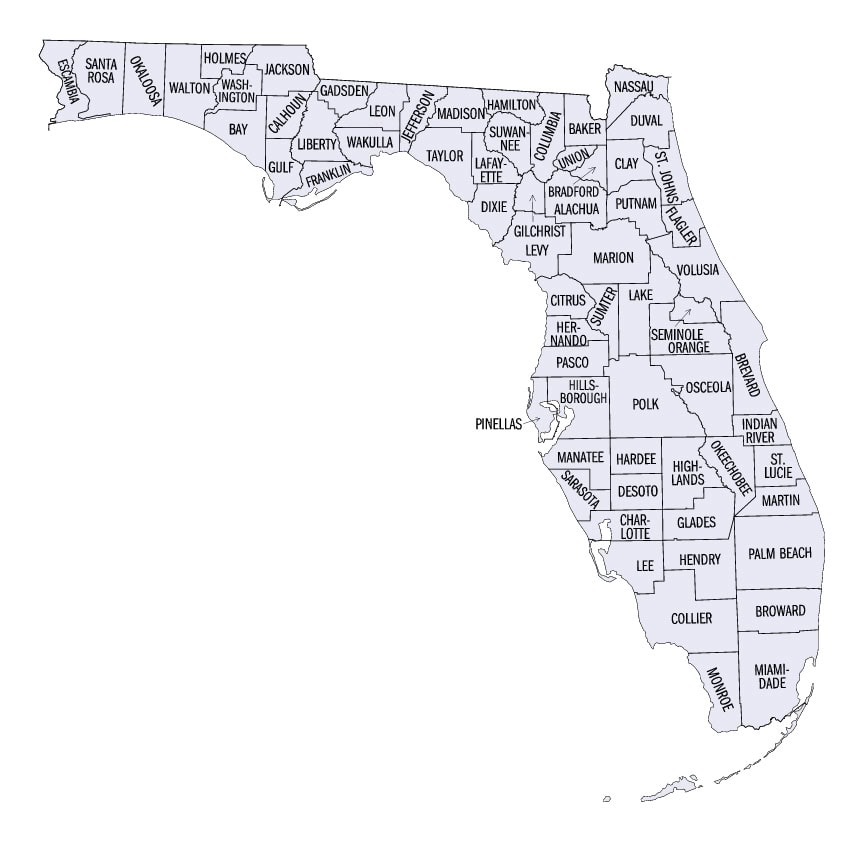List of Florida Counties

Florida’s 67 counties form the foundation of local government across the state. This list of Florida counties reflects how each region operates with its own elected officials, school district, and administrative responsibilities.
How Many Counties Are in Florida?
Florida has 67 counties. Each one runs its own local government and operates an independent school district. Most counties include several cities, one of which is designated as the county seat.
Historical Background
Florida became a U.S. territory in 1821, which marked the start of its county system. The first two counties were Escambia in the west and St. Johns in the east. The state’s most recent addition, Gilchrist County, was officially created in 1925.
County Powers and Charters
Since 1968, Florida counties have had the option to create their own charters, which allow them to shape how their local governments function. However, not all counties have adopted one, only 20 out of Florida’s 67 currently operate under a charter, while the rest still follow general state law.
Some counties have a county seat, or main administrative center, that is an incorporated municipality, meaning it’s a city or town with its own government operating alongside the county. In contrast, East Naples and Crawfordville are unincorporated, so they’re governed entirely by the county with no separate city government.
Florida County Facts
Florida’s counties vary widely in size, population, and origin. These quick facts offer a snapshot of the diversity found in the list of Florida counties.
Largest and Smallest Counties by Population
The most populous county is Miami-Dade, with over 2.8 million residents.
The least populous is Liberty County, home to fewer than 8,000 people.
Largest and Smallest Counties by Area
Collier County is the largest by land area, spanning 1,997 square miles.
Union County is the smallest, covering just 243.6 square miles.
County Naming Origins
Florida’s counties are named after a variety of influences, including U.S. political figures, Spanish explorers, Native American terms, and geographic features.
For example, Osceola County is named after a well-known Seminole leader.
Complete List of Florida Counties
Alphabetical List of All 67 Counties
- Alachua
- Baker
- Bay
- Bradford
- Brevard
- Broward
- Calhoun
- Charlotte
- Citrus
- Clay
- Collier
- Columbia
- DeSoto
- Dixie
- Duval
- Escambia
- Flagler
- Franklin
- Gadsden
- Gilchrist
- Glades
- Gulf
- Hamilton
- Hardee
- Hendry
- Hernando
- Highlands
- Hillsborough
- Holmes
- Indian River
- Jackson
- Jefferson
- Lafayette
- Lake
- Lee
- Leon
- Levy
- Liberty
- Madison
- Manatee
- Marion
- Martin
- Miami-Dade
- Monroe
- Nassau
- Okaloosa
- Okeechobee
- Orange
- Osceola
- Palm Beach
- Pasco
- Pinellas
- Polk
- Putnam
- St. Johns
- St. Lucie
- Santa Rosa
- Sarasota
- Seminole
- Sumter
- Suwannee
- Taylor
- Union
- Volusia
- Wakulla
- Walton
- Washington
FAQs
What is the newest county in Florida?
Gilchrist County is the newest, officially established in 1925.
Which county has the largest population?
Miami-Dade County leads with over 2.8 million residents.
Are all counties run the same way?
No, some use charters, while most follow general law.
What’s the smallest Florida county by population?
Liberty County, with fewer than 8,000 people.
Do counties run their own schools?
Yes, each county manages its own school district.
